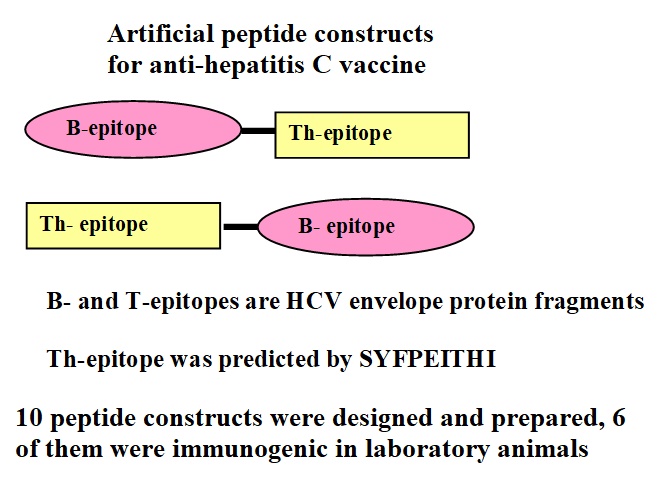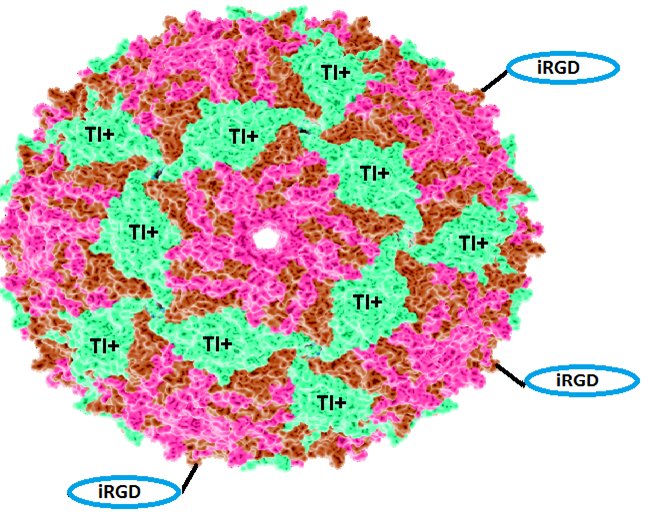Laboratory of Peptide Engineering
|
|
CONTACTS |
|
Mikhail M. Chukin
|
Igor V. Muravjov
|
RESEARCH
The main interests of the Laboratory lie in the field of peptide design, synthesis and application in drug delivery, vaccines, diagnostics and model research:
- design and synthesis of peptide ligands for targeted delivery of nanoparticles loaded with drugs;
- development of strategies and procedures for peptide conjugation to drug-containing nanoparticles;
- preparation and characterization of 1D and 2D peptidyl-polymer structures based on electro-conductive polymers for use in biosensor devices;
- preparation of anti-peptide antibodies with mono- or group specificity against whole protein molecules and specific carriers for affinity purification of these antibodies;
- development of analytic approaches and procedures for quality control of pharmaceutically significant peptides, their conjugates and peptide-containing compositions;
- design and synthesis of peptide substrates (including chromo- and fluorogenic ones) for enzyme activity studies, peptides for epitope mapping and immunization etc.
PROJECTS
The Laboratory was a pioneer in the employment of peptide scanning technology in antigenic mapping and protein-protein interaction research in Russia. Comparative linear B-epitope mapping of holo- and apo-cytochromes P450 allowed to reveal the conformational dependence of protein linear B-epitope maps (RFBR project 98-04-48684; INTAS project 96-1549). Further application of this technology to functional studies of hepatitis C virus envelope glycoproteins resulted in the detection of immunodominant linear B-epitopes and heparin-sulfate-binding sites in highly conserved regions of these proteins (“New generation vaccines and medical
diagnostic systems of the future” Program; RFBR project No. 07-04-01080). Based on this data, several peptide immunogenic constructs were designed from highly conserved fragments of the hepatitis C virus that showed antigenicity in HCV infection and were predicted as T-helper epitopes. These constructs demonstrated immunogenicity with the production of anti-hepatitis C virus antibodies in laboratory animals. No protein carrier was required for the designed constructs, hence they represented a kind of a peptide vaccine candidate capable of inducing broadly specific anti-HCV antibodies due to conserved structures of the employed B-epitopes (RFBR projects No. 07-04-12117-ofi, 10-04-91054, State contract No. 14N08.12.0025).
While performing the synthesis of peptides for HCV envelope protein mapping, we developed and validated a robust procedure for multiple parallel syntheses of peptides with so-called “difficult” sequences prone to aggregation and poor amino acid couplings (RFBR project 06-03-33033).
Further development of peptide synthesis methods and procedures brought us to the design and synthesis of multiply cyclized peptide protease inhibitors, such as analogs of sunflower trypsin inhibitor and knottins. To test the action of these inhibitors on proteases, we synthesized several peptide p-nitroanilide substrates and developed a simple procedure for peptide p-nitroanilide separation from Oxone (sodium persulfate and sulfate mixture used in peptide p-nitroanilide preparation) via adsorption on Bio-Beads SM-2 (RFBR project 13-03-00893).
The experience of our laboratory members in anti-peptide antibody preparation allowed us to prepare mono-specific antibodies against isoform 2 of the eukaryotic elongation translation factor 1A (eEF1A2), not interactive with the isoform 1 of this protein despite of the high identity (93%) of two isoforms. Our partners from the Institute of Molecular Biology and Genetics (Kyiv, Ukraine) demonstrated the appearance of eEF1A2 in malignant tumors of organs and tissues, where eEF1A2 was absent in normal conditions, thus pointing out to the putative onco-marker function of this isoform (RFBR project 14-04-90413). The last work in this field was the preparation of anti-(glutaryllysine) antibodies for the studies of protein glutarylation, together with the Moscow State University members.
Several years ago we turned to the design and preparation of peptide ligands for targeted drug delivery. Four iRGD peptides (ligands of tumor- and neoendothelial cell-specific integrins) were synthesized and coupled to bacteriophage MS2 particles, further filled with toxic Tl+ ions. This targeted drug delivery system showed its efficacy in killing cultivated cells of various tumors bearing the corresponding integrin receptors, as well as in causing tumor necrosis in immunodeficient mice with inoculated human tumors. This work was performed in cooperation with our colleagues from the Oncologic Center and Gamaleya center of Epidemiology and Microbiology and was supported in part by the “Biotechnologiya Ltd.” Company. While performing this work, we developed the method for iRGD peptide synthesis with a spacer for their further coupling to the bacteriophage and the approach and procedures for the quality control of these peptides. The research in the field of design, preparation, characterization and use of peptide ligands for targeted drug delivery by nanosized biocompatible systems is now in progress.
A new field of our laboratory research concerns the preparation of peptide-containing polymer fibers and arrays based on electroconducting polymers (e.g. polyanilines, PANI) that can be used in biosensor devices for studying various types of peptide-another biomolecule (nanoparticle, cell) interactions. This research is now in the very beginning.
- Moscow State University, Department of Bioengineering and Bioinformatics
- MIREA-Russian Technological University
- Sechenov Moscow Medical University
- Institute of Cancerogenesis, National Medical Research Center of Oncology
- The Gamaleya National Center of Epidemiology and Microbiology
- Institute of Molecular Biology and Genetics, National Academy of Sciences of Ukraine (Kyiv)
- We also perform research and custom synthesis for commercial companies
![]() Kolesnichenko A.V., Kazmina N.A. , Chistov A.A. , Vakhrenev R.G. , Kolesanova E.F. (2023) Influence of amino acid and N terminal protection residue structures on peptide p nitroanilide adsorption on polystyrene based support, Amino Acids, 55(9), 1137-1140. DOI:10.1007/s00726-023-03302-4
Kolesnichenko A.V., Kazmina N.A. , Chistov A.A. , Vakhrenev R.G. , Kolesanova E.F. (2023) Influence of amino acid and N terminal protection residue structures on peptide p nitroanilide adsorption on polystyrene based support, Amino Acids, 55(9), 1137-1140. DOI:10.1007/s00726-023-03302-4
![]() Tereshkina Yu.A., Torkhovskaya T.I., Tikhonova E.G., Kostryukova L.V., Sanzhakov M.A., Korotkevich E.I., Khudoklinova Yu.Yu., Orlova N.A., Kolesanova E.F. (2022) Nanoliposomes as drug delivery systems: safety concerns, Journal of Drug Targeting, 30(3), 313-325. DOI:10.1080/1061186X.2021.1992630
Tereshkina Yu.A., Torkhovskaya T.I., Tikhonova E.G., Kostryukova L.V., Sanzhakov M.A., Korotkevich E.I., Khudoklinova Yu.Yu., Orlova N.A., Kolesanova E.F. (2022) Nanoliposomes as drug delivery systems: safety concerns, Journal of Drug Targeting, 30(3), 313-325. DOI:10.1080/1061186X.2021.1992630
![]() Belyavtsev A.N., Shastina N.S., Kupriyanov V.V., Nikolaeva L.I., Melnikova M.V., Kolesanova E.F., Shimchishina M.Yu., Kapustin I.V. (2022) Effect of Lipid Components on Immunogenicity of Synthetic Fragment of Hepatitis C Virus NS4A Antigen, Russian Journal of Bioorganic Chemistry, 48(3), 621-627. DOI:10.1134/S1068162022030049
Belyavtsev A.N., Shastina N.S., Kupriyanov V.V., Nikolaeva L.I., Melnikova M.V., Kolesanova E.F., Shimchishina M.Yu., Kapustin I.V. (2022) Effect of Lipid Components on Immunogenicity of Synthetic Fragment of Hepatitis C Virus NS4A Antigen, Russian Journal of Bioorganic Chemistry, 48(3), 621-627. DOI:10.1134/S1068162022030049
![]() Akhmetzyanov V.A., Chibiskova O.V., Kolesanova E.F. (2022) Selection of the Most Efficient Protocol for the Immunoglobulin Y Extraction from Hen Egg Yolk, Biomedical Chemistry: Research and Methods, 5(4), e00179. DOI:10.18097/BMCRM00179
Akhmetzyanov V.A., Chibiskova O.V., Kolesanova E.F. (2022) Selection of the Most Efficient Protocol for the Immunoglobulin Y Extraction from Hen Egg Yolk, Biomedical Chemistry: Research and Methods, 5(4), e00179. DOI:10.18097/BMCRM00179
![]() Belyavtsev A.N., Melnikova M.V., Shevchenko N.G., Sapronov G.V., Vahrenev R.G., Shastina N.S., Kolesanova E.F., Nikolaeva L.I. (2021) Synthesis and Analysis of Properties of an Immunogenic Fragment from NS4A Polypeptide of Hepatitis C Virus, Russian Journal of Bioorganic Chemistry, 47(3), 713-718. DOI:10.1134/S1068162021030031
Belyavtsev A.N., Melnikova M.V., Shevchenko N.G., Sapronov G.V., Vahrenev R.G., Shastina N.S., Kolesanova E.F., Nikolaeva L.I. (2021) Synthesis and Analysis of Properties of an Immunogenic Fragment from NS4A Polypeptide of Hepatitis C Virus, Russian Journal of Bioorganic Chemistry, 47(3), 713-718. DOI:10.1134/S1068162021030031
![]() Artiukhov A.V., Kolesanova E.F., Boyko A.I., Chashnikova A.A., Gnedoy S.N., Kaehne T., Ivanova D.A., Kolesnichenko A.V., Aleshin V.A., Bunik V.I. (2021) Preparation of Affinity Purified Antibodies against ε-Glutaryl-Lysine Residues in Proteins for Investigation of Glutarylated Proteins in Animal Tissues, Biomolecules, 11(8), 1168. DOI:10.3390/biom11081168
Artiukhov A.V., Kolesanova E.F., Boyko A.I., Chashnikova A.A., Gnedoy S.N., Kaehne T., Ivanova D.A., Kolesnichenko A.V., Aleshin V.A., Bunik V.I. (2021) Preparation of Affinity Purified Antibodies against ε-Glutaryl-Lysine Residues in Proteins for Investigation of Glutarylated Proteins in Animal Tissues, Biomolecules, 11(8), 1168. DOI:10.3390/biom11081168
![]() Kostryukova L.V., Korotkevich E.I., Morozevich G.E., Kolesanova E.F., Mel`nikova M.V., Filatova Y.V., Torkhovskaya T.I., Prozorovskii V.N., Tikhonova E.G., Ipatova O.M. (2019) Effect of Cell-Penetrating Arginine Peptide on Interaction of Photosensitizer Chlorin e6 Incorporated into Phospholipid Nanoparticles with Tumor Cells, Bulletin of Experimental Biology and Medicine, 167(3), 347-350. DOI:10.1007/s10517-019-04524-x
Kostryukova L.V., Korotkevich E.I., Morozevich G.E., Kolesanova E.F., Mel`nikova M.V., Filatova Y.V., Torkhovskaya T.I., Prozorovskii V.N., Tikhonova E.G., Ipatova O.M. (2019) Effect of Cell-Penetrating Arginine Peptide on Interaction of Photosensitizer Chlorin e6 Incorporated into Phospholipid Nanoparticles with Tumor Cells, Bulletin of Experimental Biology and Medicine, 167(3), 347-350. DOI:10.1007/s10517-019-04524-x
![]() Kolesanova E.F. (2019) Tips and tricks in the preparation of anti-peptide antibodies, Chimica Oggi, 37(2), 45-47. DOI:
Kolesanova E.F. (2019) Tips and tricks in the preparation of anti-peptide antibodies, Chimica Oggi, 37(2), 45-47. DOI:
![]() Kolesanova E.F., Melnikova M.V., Bolshakova T.N., Rybalkina E.Y., Sivov I.G. (2019) Bacteriophage MS2 As a Tool for Targeted Delivery in Solid Tumor Chemotherapy, Acta Naturae, 11№2(41), 37-40. DOI:10.32607/20758251-2019-11-2-98-101
Kolesanova E.F., Melnikova M.V., Bolshakova T.N., Rybalkina E.Y., Sivov I.G. (2019) Bacteriophage MS2 As a Tool for Targeted Delivery in Solid Tumor Chemotherapy, Acta Naturae, 11№2(41), 37-40. DOI:10.32607/20758251-2019-11-2-98-101



